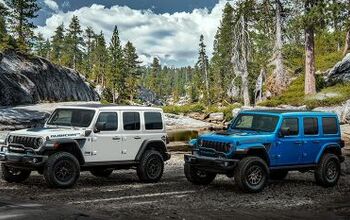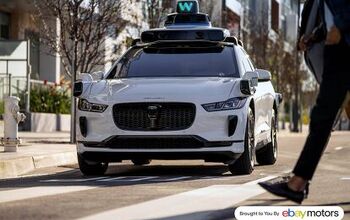New Vehicles Are More Powerful and Efficient Than Ever, but the Greenest Automaker Only Sells Gas Models: Study

Every year, the Environmental Protection Agency tabulates all available data for new vehicles sold in the United States and prints colorful graphs showing the country’s progress — or in some cases, regression — in key areas of autodom. Areas like average fuel economy, vehicle weight, horsepower, and emissions.
It’s a tradition dating back to the heady, wide-lapelled days of 1975.
The most recent report on light-duty vehicles in the U.S. shows definite, albeit incremental, progress towards many environmental goals. While the auto landscape may not be advancing at the rate preferred by many environmentalists, urbanists, and the Tesla fan base, there’s cause for celebration within the report’s pages. There’s also a special prize in there reserved just for Mazda.
Why Mazda? Well, the slightly offbeat, lower-volume automaker managed to earn the title of greenest vehicle fleet without a single hybrid or electric car in its portfolio.
In terms of average adjusted fuel economy, Mazda’s 2016 fleet topped all others with a rating of 29.6 miles per gallon. Sales-weighted carbon dioxide emissions of 301 grams per mile also topped all other brands, including second-place Hyundai (the most-improved automaker for 2016).
While Mazda, with a helping hand from Toyota, plans to enter the electrified arena in the near future, its love of high-compression four-cylinders and lack of trucks or very large (or larger and strong-selling) SUVs earns it the top spot on the tree-hugging podium.
Dead last for both fuel economy and greenhouse gas emissions was truck-heavy Fiat Chrysler. Compared to 2015, the average thirstiness of FCA’s fleet increased by 0.3 mpg, with CO2 emissions rising by 4 grams per mile. Also falling lower in the rankings for 2016 was Honda, Nissan, and BMW, all of which saw extra SUV volume in the last year with full data. Overall, the industry improved by 0.1 mpg and 2 grams per mile.
If that increase sounds pretty low, blame the consumer. The average fuel economy of all five classes of vehicle — car, crossover, body-on-frame SUV, truck, and minivan — rose in 2016, in some cases by a significant amount (both types of utility vehicle hit a record high, with pickups tying a 1986 record), but buyers took home many more large vehicles than the previous year. Combined market share of car-based and truck-based SUVs rose to 41 percent in 2016. Thus, the evolving mix decreased the fleetwide benefit of improvements made within each segment.
One thing that didn’t change in 2016 was average vehicle weight. Stable at 4,035 pounds, the figure belies the fact that the average weight of a new truck dropped by 24 pounds (thank you, midsize class and aluminum F-150), while cars shed, on average, 23 pounds. Average horsepower rose by one stallion to 230 hp.
As trucks and SUVs make up more of the mix, the EPA predicts an average vehicle weight increase of 9 pounds for 2017, plus a 2 hp boost in average engine output. At the same time, it projects a 0.5 mpg average increase, and 7 fewer grams of CO2 per mile.

More by Steph Willems
Latest Car Reviews
Read moreLatest Product Reviews
Read moreRecent Comments
- Kwik_Shift_Pro4X Defender looks way better than the Bronco in both 2-door and 4-door.
- ToolGuy I found this particular episode to be incredibly offensive.I am shocked that eBay Motors is supporting this kind of language and attitudes in 2024.I will certainly keep this in mind next time I am choosing where to buy auto parts (I buy a LOT of auto parts).
- SaulTigh When I was young in the late 80's one of my friends had the "cool dad." You know the guy, first to buy a Betamax and a C-band satellite dish. Couple of stand up arcade games in the den. Bought my friend an Atari 2600 as soon as they came out. He had two of these crap heaps. One that only ran half the time and one for parts in the yard. My middle school brain though he was the most awesome dad ever, buying us pizza and letting us watch R rated movies recorded on free HBO weekend. At the time I though he was much better than my boring father.Now with adult hindsight, I now know he was "dad who should have taken better care of his family" and not had so many toys.
- Dave Has to be Indy 500. Many more leaders and front passes than NASCAR, and Monaco is unwatchable with the inability to pass on that circuit.
- Jeff How did the discussion get from an article about a 56 billion dollar pay package for Elon Musk to a proposal to charge a per mile tax on EVs in California or paying increase registration on vehicles to make up for lost gas tax revenue? I thought such a discussion would better fit Matt's Gas Wars series.


































Comments
Join the conversation
Can we see another irrelevant article/study on the same subject, only removing the trucks from the line up of those companies that have trucks in them? Chrysler only sells two vehicles but Ram only has trucks, Dodge doesn't have trucks, but has all of those power houses. Chevrolet has several to choose from when you remove the truck line up, but GMC only has a few cross overs when you remove the truck line up. Toyota, Nissan, Honda also have trucks(even though a lot don't consider the Ridgeline a truck, it still has an open bed. The only companies I can think of that don't have a truck would be Hyundai, Mercedes(F/S vans though), BMW, Jaguar. How would the end be when the game is fair?
I don't think Mazda is intentionally doing that, but rather they have no budget building trucks and SUVs that makes a lot of money and has to settle for the low margin high mpg cars.